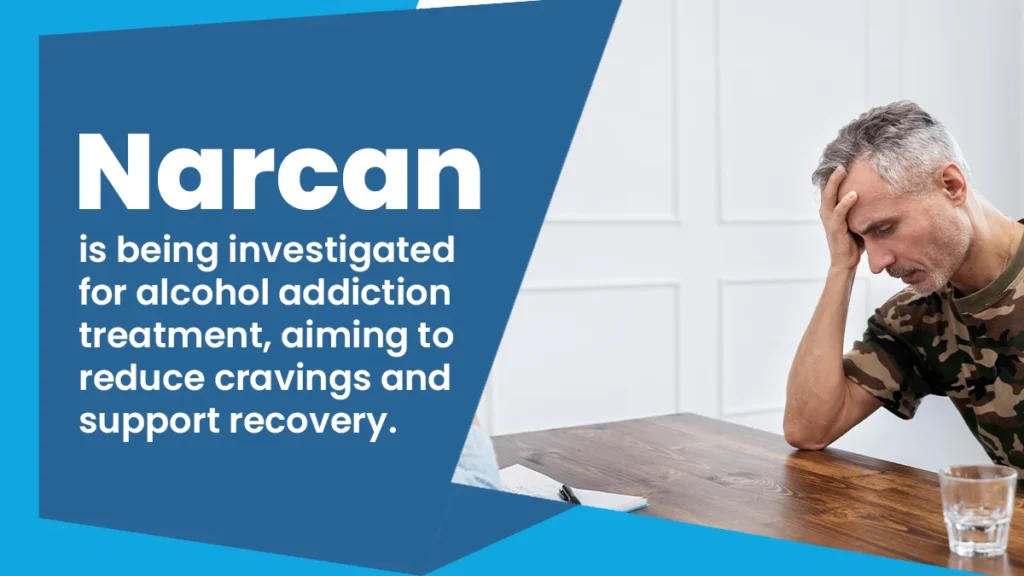Narcan, also known as naloxone, is a medication widely used to reverse opioid overdoses. Recently, it’s been explored as a potential treatment for alcohol addiction. This treatment aims to reduce alcohol cravings and prevent relapses by blocking the effects of alcohol on the brain.
But is Narcan truly effective in treating alcohol addiction? Opinions vary, and research is ongoing. To explore whether Narcan could be a helpful tool in alcohol addiction recovery, read on for deeper insights.
Key Takeaways
Narcan is a life-saving medication that quickly reverses opioid overdoses by blocking their effects on the brain. Here’s what you should know:
- Narcan is being studied for alcohol addiction treatment, focusing on reducing cravings and preventing relapse effectively.
- Compared to other treatment options, Narcan offers a unique approach by targeting the brain’s response to alcohol.
- Concerns and criticisms of Narcan in alcohol treatment include its limited effectiveness and potential for misuse.
At The Haven Detox-New Jersey, we offer various treatment services to help you overcome alcohol addiction. Call us at (856) 565-3102 for details.

Understanding Narcan
Narcan, also known as naloxone, is an opioid antagonist. This means it blocks the effects of opioid drugs on the body. Narcan is a life-saving medication used to reverse opioid overdoses. It works quickly to block the effects of opioid drugs on the brain. This emergency treatment can save lives by restoring normal breathing in those suffering from opioid overdose symptoms. It is available in a nasal spray or injectable form and can quickly reverse the signs of an opioid overdose.
How It Works
Narcan works by attaching to opioid receptors in the brain, blocking opioid effects. This action rapidly reverses overdose symptoms like shallow breathing. Narcan’s fast-acting nature makes it an essential tool in emergency treatment for opioid overdose, saving lives.
Traditional Uses Of Narcan
Narcan has been traditionally used in emergency settings to treat opioid overdoses. It helps reverse life-threatening symptoms caused by opioid use disorder. By blocking opioid receptors, Narcan can restore normal breathing and reduce the risk of overdose deaths.
The Role Of Narcan In Alcohol Addiction Treatment
Along with treating opioid emergencies, Narcan is being studied for alcohol use disorder (AUD). Doctors consider it for managing severe alcohol withdrawal symptoms and alcohol poisoning. It may assist patients experiencing alcohol overdose, offering potential new ways to address alcohol dependence.
Emerging Research
Emerging research explores Narcan’s possible use for alcohol intoxication and withdrawal. Scientists are studying its effects on the brain and body, particularly in treating AUD. Medical professionals hope to find new treatment options for individuals struggling with alcohol dependence and substance use disorders.
Potential Benefits
Narcan may offer benefits for patients with alcohol abuse by managing alcohol poisoning and overdose. It could reduce the need for other prescription medications with harmful side effects. Patients in treatment facilities might receive Narcan to prevent severe withdrawal symptoms or alcohol-related medical emergencies.
Limitations And Concerns
Narcan’s use for alcohol addiction faces limitations and concerns. Its effectiveness in treating AUD is not yet fully understood. Healthcare professionals worry about side effects and potential liver damage. More research is needed before recommending Narcan for widespread use in alcohol addiction treatment.
Comparing Narcan With Other Treatment Options
Narcan treats opioid addiction, but its role in alcohol addiction is limited. People often need different medical treatments for alcohol issues, such as therapy or medications. Comparing options helps understand the best treatment plan for specific cases of substance abuse.
Traditional Methods
Alcohol addiction treatment usually involves traditional methods like Alcoholics Anonymous (AA), therapy, and medication. These options provide different levels of medical assistance and support. A treatment provider can help people find the right combination for their health conditions and long-term use.
Pros And Cons Of Narcan Vs. Other Treatments
Narcan is used for opioid addiction, not alcohol addiction cases. Research studies highlight its effectiveness in emergencies, but it doesn’t treat alcohol abuse. Traditional methods like therapy offer comprehensive medical care and may provide better long-term solutions for alcohol-related health issues.
How Narcan Is Administered For Alcohol Addiction
Narcan is an FDA-approved medication primarily used for opioid overdoses, not alcohol addiction. Its administration involves specific methods and dosages tailored by a medical team. Understanding Narcan’s use and monitoring is crucial for effective treatment services.
Dosage And Frequency
Narcan dosage and frequency vary based on individual needs. Medical advice is essential for determining the correct amount. Typically, the FDA-approved medicine is administered as needed, following specific guidelines set by healthcare professionals.
Administration Method
Narcan is usually administered via injection or nasal spray. The injection delivers the medicine quickly into the bloodstream, while the nasal spray is easier to use. Both methods require medical help for proper application and effectiveness.
Monitoring And Follow-Up
Monitoring and follow-up are critical after Narcan administration. The medical team will track progress and adjust treatment services as needed. Regular check-ins ensure the medication works effectively and helps manage any side effects.
Concerns And Criticisms
Narcan, primarily used to reverse opioid overdoses, has faced scrutiny for its use in alcohol addiction treatment. While it effectively counters opioid overdoses, its application in alcohol addiction is not FDA-approved. This raises concerns among healthcare providers and pharmacists about its specific uses for alcohol-related issues.
Family members and friends of adults struggling with alcohol addiction may seek information about Narcan as a potential treatment. However, its off-label use for alcohol addiction lacks solid evidence and FDA endorsement. This uncertainty can lead to confusion and possible misuse of the medication at home.
In the United States, the focus remains on proven methods for treating alcohol addiction. Healthcare providers emphasize traditional therapies and support systems over unapproved treatments like Narcan. Ensuring safety and effectiveness in addiction treatment requires relying on established, evidence-based approaches rather than experimental uses of medications.
Frequently Asked Questions (FAQ)
Is Narcan used for alcohol withdrawal?
Narcan, or naloxone, is specifically designed to reverse opioid overdoses by blocking the effects of opioids. Its off-label use for alcohol addiction lacks solid evidence and FDA endorsement. Alcohol withdrawal requires different treatments, such as benzodiazepines, to manage symptoms like anxiety and prevent seizures. Narcan helps only in emergencies related to opioid overdoses, not alcohol issues.
For alcohol withdrawal, medical professionals use other medications and therapies to support recovery. If someone experiences alcohol withdrawal symptoms, seeking professional help is essential for proper care and treatment. Narcan is effective in specific situations but does not address alcohol withdrawal needs.
How effective is Narcan in treating alcohol addiction compared to other treatments?
Narcan (naloxone) is designed to reverse opioid overdoses and is not considered very effective in treating alcohol addiction. Alcohol addiction requires different approaches, such as counseling, medication, and support groups. However, drugs like disulfiram or naltrexone are used to help manage alcohol cravings and maintain sobriety.
In addition to medication, behavioral therapies, and support groups offer valuable support and strategies for alcohol addiction recovery. If you or someone you know is struggling with alcohol addiction, it’s essential to seek professional help to find the most effective treatment plan tailored to your individual needs.
Get Expert Help At The Haven Detox-New Jersey
At The Haven Detox-New Jersey, we are committed to helping you navigate the complexities of alcohol addiction treatment.
Our drug and alcohol detox services provide a safe and supportive environment for clearing harmful substances from your system under medical supervision. In addition, our residential rehab program offers comprehensive, round-the-clock care in a structured setting to support long-term recovery.Contact us today at (856) 565-3102 to learn how we can help you achieve a healthier, more fulfilling life.

